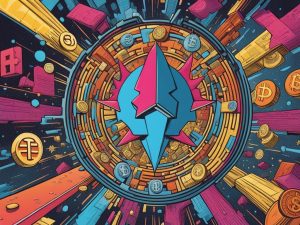Shaping Cardano’s Future Through On-Chain Governance
Cardano is leading the way in blockchain innovation with its on-chain governance system. This unique mechanism empowers ADA holders to have a direct impact on the platform’s future by voting on proposals and suggestions. Through on-chain governance, Cardano is revolutionizing decision-making in the blockchain industry, allowing for swift improvements and community-driven initiatives.
The Efficiency of On-Chain Governance
Emphasizing the importance of agility in today’s fast-paced blockchain environment, Charles Hoskinson, the founder of Cardano, believes that on-chain voting is essential for keeping the platform competitive and relevant. This voting system not only streamlines technological advancements but also influences branding, marketing, and research funding within the Cardano ecosystem.
- On-chain governance simplifies decision-making processes
- ADA holders can vote on funding security projects and educational initiatives
- Allows for quick improvements to maintain competitiveness
Fostering Consensus in a Diverse Community
Implementing on-chain governance presents challenges, especially when striving for consensus among a geographically dispersed and diverse group of stakeholders. Cardano addressed these challenges through a two-year development effort resulting in SIP 1694, a governance framework named after the Enlightenment philosopher Voltaire.
- SIP 1694 aims to balance efficiency, effectiveness, and integrity
- Challenges of achieving governance trilemma highlighted by Hoskinson
- Creation of a blockchain constitution for the Cardano ecosystem
Empowering Through Voting Rights
Cardano’s approach to on-chain governance extends beyond simple voting mechanisms. The platform is pioneering a blockchain constitution that outlines basic rights for ecosystem participants and decentralized applications (dApps). By combining elements of representation and flexibility, Cardano’s governance model promotes fairness and openness.
- Introduction of a blockchain constitution for Cardano ecosystem members
- Utilization of a liquid democracy paradigm for voting representation
- Empowering ADA holders with the ability to delegate voting rights
Challenges and Opportunities Ahead
While Cardano’s innovative approach to on-chain governance is laudable, there are potential challenges on the horizon. Voter apathy, the influence of large token holders, and the complexity of voting on technical proposals are all obstacles that must be overcome. However, Cardano’s community engagement initiatives and rigorous testing protocols demonstrate a commitment to mitigating these risks.
- Addressing potential obstacles to effective on-chain governance
- Community involvement through seminars and testing processes
- Anticipation of Cardano’s final node release and governance rollout
Hot Take: The Future of Community-Driven Decision-Making
On-chain governance marks a significant turning point for Cardano, the proof-of-stake blockchain famed for its painstaking development process. By means of voting on suggestions, this creative mechanism enables ADA holders to directly shape the future of the platform.





 By
By

 By
By
 By
By
 By
By
 By
By